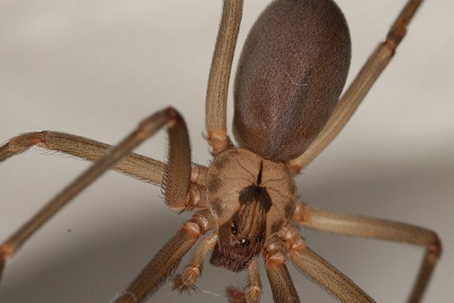Let’s be honest. We all hate spiders. Spider webs in the corners of rooms or under our outdoor furniture can be gross. Then there’s the whole fear of walking through a spiderweb. That'll set you off. Have you ever gotten caught in a web out in the yard? Every time you walk to that spot again for the next year you’ll be karate chopping the air or waving a cautionary stick in front of your face.
But that’s about the extent of the nuisance, isn’t it? How often do you get bitten by a spider? And when you do, the bite might itch for a few minutes at the most. Not many stop to think about the more dangerous spiders until after they’ve suffered severe consequences. However, if you understood more about the health threat that a brown recluse bite poses to you and your family, you might be more proactive in how you prevent their setting up shop on your property.
Brown Recluse Season
The brown recluse is one of the world’s deadliest spiders, but they do generate a lot of misinformation. They are commonly mistaken for wolf spiders, which share the same size (about as big as a quarter, including legs) and color (light brown to tan). But don't worry. There are a few ways you can differentiate a brown recluse from a wolf spider:
- A brown recluse has a dark brown/black shape on its back, closely resembling a violin.
- They also have very spindly legs, which gives them the appearance of actually being translucent. You’ll notice the brown and black of the body before you see the legs.
- A brown recluse will not be nearly as hairy as the wolf spider, so if the spider in question has a little fuzz to it, you’re probably okay.
- Furthermore, they do have a presence in South Carolina, and this presence is a year-round problem. Most people consider them a scourge to summer activities only, but they are active throughout the year. While they might be most active in June, July, and August, if you’ve got a brown recluse problem on your property, it’s going to cause year-round worry.
Prevention Strategies
If you’ve got a brown recluse infestation in your home, that’s a dangerous situation to be in. Typically, keeping pests out of your home is important because of the chance for them to spread diseases into your living areas and onto your frequently touched surfaces. Most pests don’t present a direct threat to your health through biting like the brown recluse.
You see, a brown recluse bite actually begins eating away at the skin from the top layer, sometimes even making its way down to the bone (in extreme cases). No matter the circumstance, a brown recluse bite often requires medical attention. That’s why preventing them from setting up camp inside your home is paramount. So how do you do that?
Some things you can do on your own to prevent brown recluse activity in your house include:
- Limiting their access by sealing cracks and entryways
- Reducing conditions that attract them such as clutter and damp spaces in the home
- Getting rid of other small pests that a brown recluse would like to feed on
- Consistent de-webbing practices
- Vacuuming regularly
Now, these may not seem too difficult (until you try to get rid of all your cracks and seal all entry points). As with most things, however, trying to prevent brown recluse activity on your own will lead to headaches and inconsistent results. Plus, when there are severe health risks for you and your family on the line… why take the chance.
The absolute best way to prevent brown recluse activity on your property is to engage the help of the expert pest technicians at The Original Bug Man Pest Elimination, Inc. Sometimes, to be safe, you just have to go with the pros. Learn more about our home pest control and commercial pest control service options.
Schedule Your Free Inspection
Complete the form below to schedule your no-obligation inspection.

